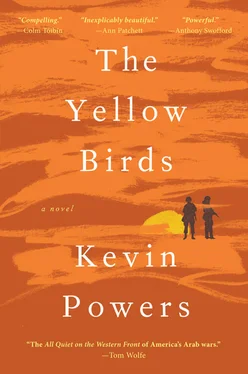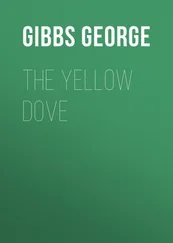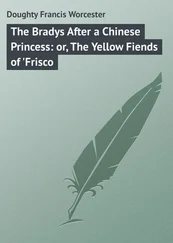Richmond, Virginia
By the time autumn came again I was firmly settled in the old gasworks building at the edge of the river. My life was small. I lived in an apartment on an upper floor and had little in the way of companionship. It was perfect for a while. A stray tortoiseshell cat would occasionally settle in an unkempt flowerbox hanging from my window. It had a habit of meandering over ledges and sills, jumping between air-conditioning units and the building’s few balconies. I reached out once or twice and tried to pet it. “Here, buddy,” I said, “here, kitty-kit,” but it only mewed at me and continued rubbing its face on the stub of a naked branch. I’d strung a few medals above a small gas heating unit. The picture of Murph I’d taken from his helmet was tacked into a nook of broken plaster next to the window. I rarely went out.
Sometimes I’d cross the footbridge to the city side of the river to get a case of beer or a box of frozen potpies. On the way back I always noticed the diminished intervals between my footfalls, looking mostly down at the tops of my boots, how my gait had withered to a shuffle since I’d come home. When it got cold enough I’d rest a few beers on the windowsill overnight. I’d cook a potpie on a hot plate, as I was unequipped to follow the proper heating instructions. As night settled in, and frost spread on the edges of the windows, I’d flip through news stories in magazines picked out of garbage cans, searching for the names of places I had been. I’d eat a half-cooked meal and drink enough of the window-chilled beers to fall asleep. I often wondered what someone would see if they looked up from the river as it cut its habitual curve through the little valley, my arm above it, skinny and white, reaching through a yellowed curtain, a disembodied hand pulling in, from time to time, one last, yes just one last, beer before sleep.
In the mornings I’d walk up to the roof of the building and work the lever of a cheap rifle I’d picked up from Kmart, shooting at the refuse accumulating at the base of the building. Small trash fires sometimes began when a spark from the lead settled into ember on the cardboard and discarded fabrics below me. I traced the paths of birds in flight, following closely behind the creatures, embracing them in the two stakes of my sight post. But some reflexive tremor always overtook me and I’d work the action, over and over, expending the unfired cartridges to scatter on the tarred rooftop around my lawn chair.
That was more or less my life. I was like the curator of a small unvisited museum. I didn’t require much of myself. I might return a small trinket from the war back to a shoebox, take another out. Here a shell casing, there a patch from the right shoulder of a uniform: articles that marked a life I was not convinced had needed to be lived.
I knew the C.I.D. investigators would find me eventually, and I was pretty sure I knew what they wanted. Someone had to be punished for what happened to Murph. It probably wouldn’t matter what our level of culpability was. I was guilty of something, that much was certain, that much I could feel on a cellular level. What crimes we had committed, though, which articles we’d be charged under, didn’t seem to matter. They’d find ones broad enough to fit over what it was we’d done, and justice would be served, and Murph’s mother would be satisfied, would stop asking whether the army covered up the nature of her son’s death.
And me? That letter? Five years was my guess. I only vaguely remembered the long cursory sessions of legal instruction in the auditorium during basic. The drill sergeants had seemed to really turn the screws on us the night before. Front-back-goes for hours in the barracks hallway, the morning run that turned our legs to quivering spindles, and when the JAG officer got up on stage to tell us everything that was expected of us according to the Uniform Code of Military Justice, all I can remember is being on the edge of sleep, feeling like I was floating in the cushioned theater chair and loving it. I’m not blameless. Some will say I should have known: goddammit, you were a soldier and you couldn’t even stay awake? Well, see, I was no hero, no poster boy, I was lucky to get out upright and breathing. I’d been willing to trade anything for that. That’s what my cowardice was: I accepted the fact that a debt would come due, but not now, please not now, anything for a little more time.
It happened so easily when the day came. Something turned. The note was called in. I remember the white sky and fog above the James, snow, unbelievably early for Virginia, beginning to fall over the hotels and abandoned tobacco warehouses, each flake a repetition of the one before as they descended through the veil of just how little I remembered, and my memory narrowing, the snow falling unmercifully as it spread over the river, the sky now white forever and unbroken and low.
Every moment has turned over in my mind since I came back from Al Tafar. Each one unlinked. But then it was just another day, the snow nothing more than a curious way to distinguish that day from the day before. I’d put my hands through the open window when it started and watched, untroubled, as each flake met my skin and melted, saw the river stones take on a thin sheet of blankness underneath the naked sycamore and dogwood trees that lined the avenue below. A car pulled up, a Mercury, I think, gray in color. A man stepped out. The small silver bars on his shoulders reflecting off an unknown light as he closed the door.
As I think about it now, all the times I think of the unceasing footfalls, the endless loop in which I watch him walking up the street, it seems as though I should have asked the snow to stop, for one reprieve, to not have to face another next. But even in my mind the fire of time still burns, just the same as it did then.
The knock came quickly after that. I opened my door, ashamed at the state of myself, unshaven, my life more or less ignored. There were times I’d been pleased with my ability to give up, to forget, to wait…for what? I don’t know. The captain entered the room and stood looming over the emptiness in which I lived. I wore only a pair of PT shorts and an unwashed sleeveless undershirt, stained a little. It was cold. The snow filled the window with whiteness as though a shroud had been hung over it. A thin blanket hung from my shoulders and I stank. It had been weeks since I’d drawn a sober breath.
“John?” he asked softly.
“Yes, sir.”
“I’m Captain Anderson, from C.I.D.” He laid his hat down on the small table that more or less furnished the room. “Do you know why I’m here?”
“My mother said—”
“She said you left.”
“I did.”
He smiled. “You can’t run from us, John. Anyway, we just want to talk.”
Something about the way he spoke seemed strange. His voice was gentle, but it had a power and certainty behind it. I remembered that as he spoke, Mother Army also spoke. Tall and athletic-looking, he also carried the paunch of a tenured gym teacher who lives alone and washes down the sports news shows with a six-pack by himself. His eyes were a little worn down. He was old for captain’s bars.
“You know LaDonna Murphy.”
I didn’t say anything.
He pulled a clear bag with an envelope inside it out of his inside jacket pocket. I could see that it had been torn open, roughly, hurriedly. “That wasn’t a question,” he said. He walked over to the wall where my few medals hung and looked at each one carefully, pausing for a few moments at the spot where I’d tacked up the photo of Murph.
“You wrote this letter.”
I didn’t know what to say. If writing it was wrong, then I was wrong. If writing it was not wrong, enough of what I’d done had been wrong and I would accept whatever punishment it carried. I was ready. Everything I could recall about the war flashed kaleidoscopically, and I closed my eyes and I felt the weight of time wash over my body. I could not pattern it. None of it made sense. Nothing followed from anything else and I was required to answer for a story that did not exist.
Читать дальше












